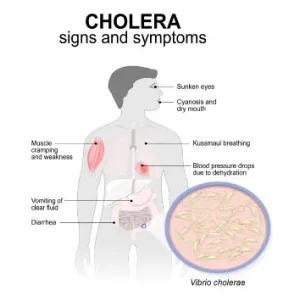Overview
Diagnosis
In regions where cholera is common, symptoms may seem easy to recognize. However, a stool test is the only way to confirm cholera infection.
Rapid cholera dipstick tests allow healthcare professionals in remote areas to quickly identify the disease. Fast testing helps reduce death rates early in outbreaks and supports quicker public health measures for outbreak control.
Treatment
Cholera requires immediate care because it can cause death within hours if untreated.
Main treatments include:
-
Rehydration – The goal is to replace lost fluids and electrolytes with oral rehydration salts (ORS). The ORS powder is mixed with boiled or bottled water. Without treatment, up to half of people with severe cholera may die, but with prompt treatment, deaths drop to less than 1%.
-
Fluids through a vein (IV fluids) – Used for people who are severely dehydrated or unable to drink enough fluids orally.
-
Antibiotics – Helpful in some severe cases to reduce the duration of diarrhea and bacterial infection, but not always necessary.
-
Zinc supplements – Can reduce diarrhea and shorten recovery time, especially in children.
Preparing for your appointment
If you are in or have recently returned from a country where cholera occurs, seek medical care right away for serious diarrhea or vomiting.
If your symptoms are mild but you suspect exposure, contact your healthcare provider and mention possible cholera exposure.
When preparing for your appointment:
-
Ask if there are any instructions or restrictions before your visit.
-
Make a list of:
-
Your symptoms, including when they began and how severe they are.
-
Any recent exposure to possible infection sources, especially travel abroad.
-
Key medical information, such as existing health conditions.
-
All medicines, vitamins, and supplements you take, including doses.
-
Questions you want to ask your healthcare professional.
-
Questions to ask your healthcare professional
-
Are there other possible causes of my symptoms?
-
What tests do I need?
-
What treatment do you recommend?
-
How soon should I feel better after starting treatment?
-
How long will recovery take?
-
When can I return to work or school?
-
Are there any long-term risks from cholera?
-
Am I contagious, and how can I prevent spreading it to others?
What to expect from your doctor
Your healthcare professional may ask questions such as:
-
Have you had watery diarrhea? How severe is it?
-
Have you noticed anything unusual about your stools?
-
Have you been vomiting?
-
Have you had symptoms of dehydration, such as thirst, muscle cramps, or fatigue?
-
Are you able to keep down food or liquids?
-
Have you recently eaten raw shellfish, such as oysters?
-
Are you pregnant?
-
Do you know your blood type?
What you can do in the meantime
Stay hydrated. Use oral rehydration solutions (ORS) if you have diarrhea or vomiting that could be cholera-related.
In most developing countries, ORS packets are available at pharmacies. These are mixed with clean drinking or boiled water following the package instructions.
If ORS packets are unavailable, you can make a homemade rehydration solution:
-
1 quart (about 1 liter) of bottled or boiled water
-
6 level teaspoons (about 30 milliliters) of table sugar
-
1/2 level teaspoon (about 2.5 milliliters) of table salt
Mix well and drink frequently to replace lost fluids and electrolytes.
Advertisement

